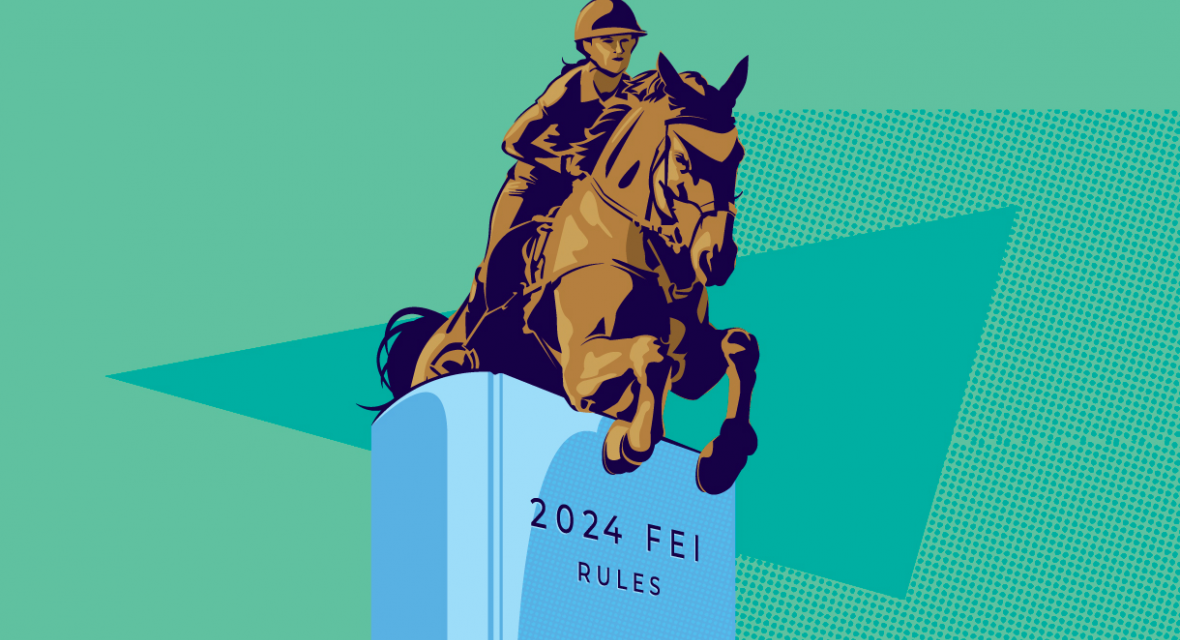FEI rules – what changes might we see in 2024?
The FEI has published the proposed changes to its rules for 2024. National Federations (“NFs”) and stakeholder organisations now have until 16 August 2023 to provide feedback on the proposed changes.
Comments can be submitted online, using the FEI’s dedicated rules revision platform (using templates which can be found here). If you are an athlete, official, owner, groom or other individual in the equestrian community, you will need to provide feedback through your NF or a stakeholder organisation that you are part of (such as an international riders / officials / owners / grooms club).
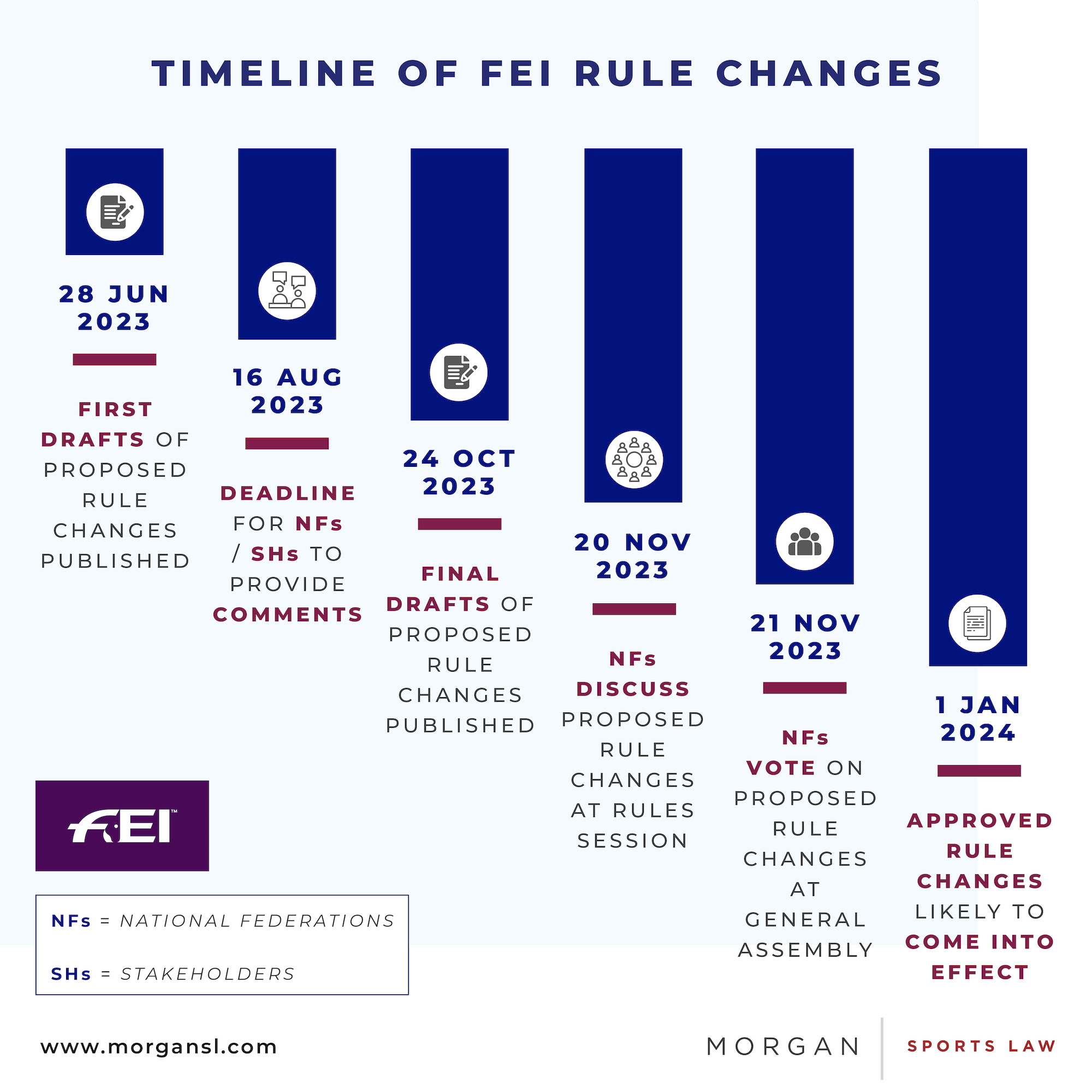
We outline below some of the key changes proposed. Remember, these are only drafts – and further revisions are likely to be made after the first round of feedback.
Please note, this article does not cover the proposed changes to the Endurance Rules, which are being reviewed in full this year. Those changes can be viewed here.
All disciplines
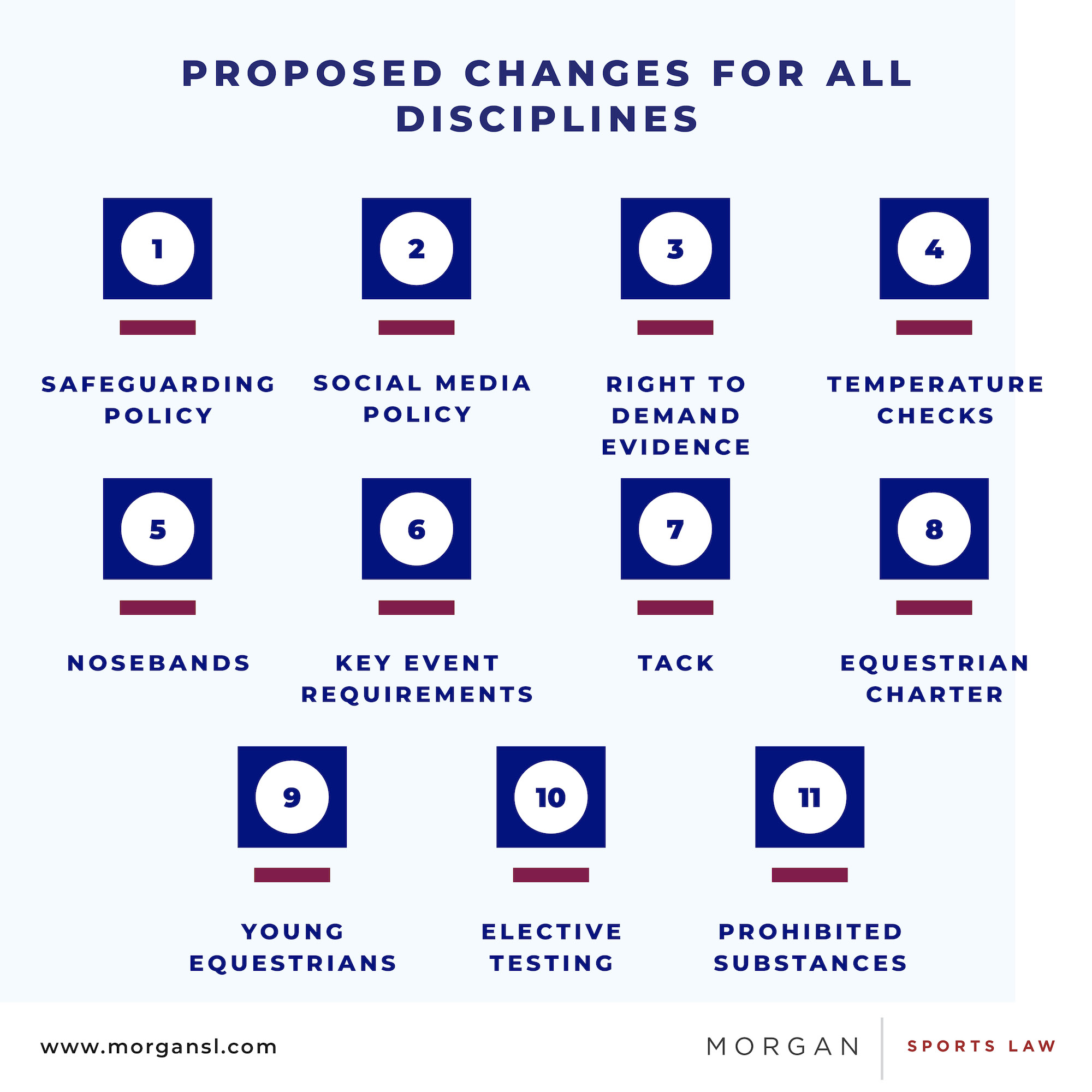
Safeguarding Policy: The FEI is proposing to amend its Safeguarding Policy against Harassment and Abuse. The FEI has proposed removing its obligation to act in cases where the conduct in question does potentially breach the policy, but does not pose a risk of harm in the context of equestrian sport.
Social Media Policy for Athletes and Officials: The FEI is proposing to add two new Social Media policies to its General Regulations – one for athletes and one for officials. Currently, the FEI has Social Media Guidelines but they are only guidelines (rather than rules) and they only apply to officials, FEI staff and board members (rather than to athletes).
The Social Media policies will include provisions to the effect that:
- Athletes and officials are prohibited from making derogatory or offensive comments about the FEI or any individuals associated with equestrian sport (such as other athletes or officials, chefs d’equipe, coaches, teams and organisers).
- Officials must not promote products / brands that may compromise their impartiality or raise questions about their integrity.
- Athletes must fact check information before they share it, in order to guard against the proliferation of fake news.
Violations may result in disciplinary action including demotion / removal (for officials), fines (for athletes), and warnings and suspensions (for both athletes and officials).
FEI’s power to demand evidence: The FEI is proposing that it should have the power to demand evidence. This means that an individual may be forced to provide evidence in relation to an FEI investigation – for example, by handing over physical items to the FEI, attending an interview and/or providing a statement. Refusal or failure to do so would be a violation of the FEI rules and may result in disciplinary proceedings and sanctions.
Temperature checks: The FEI has already introduced a requirement for athletes to check their horse’s temperature in the lead up to and while at events, to combat the spread of viruses like EHV-1. Failure to do so can lead to penalties. However, there have been reports of people falsifying temperature checks. The FEI is proposing several changes to tighten up this regime.
Under the FEI’s proposals, FEI vets will have the power to request a horse temperature check at any time during an FEI event. Moreover, FEI vets will be required to check the temperature of 5% of horses every day at certain events.
Falsification of a temperature record will lead to disqualification and a report to the FEI Veterinary Department. Anyone recording a horse’s temperature using an unapproved method will be reported to the FEI Veterinary Department.
Nosebands: The FEI proposes harmonising the rules on nosebands across disciplines, by introducing a tool to measure noseband tightness (removing the subjectivity of the current method of measuring with fingers). Combinations will not be able to start until the noseband is sufficiently loose, and if a tight noseband is found during competition, the combination will be eliminated and the athlete will be given a Yellow Warning Card.
Key Event Requirements: The FEI is proposing to introduce a framework of requirements that events must comply with otherwise they risk being removed from the FEI calendar (Key Event Requirements – “KERs”).
The Secretary General already has the power to remove any event from the official FEI calendar in “justified circumstances” but the addition of specific requirements will allow the FEI to better rationalise any such decision. Some of the KERs refer to existing rules but there are new stable requirements, including regarding cleaning and disinfection, ventilation, lighting, water, fire safety and use of space.
Tack, Equipment and Dress: The FEI has launched its FEI Tack App, which has a searchable database of permissible and prohibited tack, equipment and dress. The rules (and guidelines) on this topic for each separate discipline will now be updated or removed.
Equestrian Charter: The FEI proposes creating an Equestrian Charter which everyone involved in FEI sport must agree to. It sets out three key promises which are all centred around horse welfare.
Young Equestrians
U25 Championships: Following a request from several NFs, the FEI will consider creating U25 Championships for Jumping, Eventing and possibly other disciplines (there is currently only an annual U25 Championships for Dressage). The FEI will consult with relevant bodies on which disciplines should implement this and how often such Championships should take place, with any new competitions likely to start in several years’ time.
Youth Representatives for Technical Committees: Several NFs, together with the European Equestrian Federation, requested that there be a Youth Representative on each Technical Committee (in addition to the existing Athlete Representative) to provide a voice for young equestrians and to ensure the sport continues to attract and maintain the interest of young people.
The FEI has decided not to implement this and has instead asked the Technical Committees to ensure they comply with the existing rules which require each committee meeting to have the topic of youth on the agenda.
Anti-Doping
Elective Testing: Athletes can currently request that their FEI horse is tested for presence of a Controlled Medication Substance (if, for example, they are concerned that their horse has accidentally come into contact with something, or a withdrawal time has not been correctly implemented). The FEI proposes to expand this program so that athletes can also check for certain Banned Substances that are Specified Substances, e.g. synephrine, arsenic and oripavine.
Prohibited List: The FEI is planning to add a number of substances to the Equine Prohibited Substances List, including Pregabalin, 17-hydroxyprogesterone hexanoate and Canagliflozin. The FEI will also adopt thresholds for testing arsenic and cobalt and a screening limit for Dimethyl Sulphoxide (DMSO).
Jumping
Faults: This is not technically a proposed rule change, however the FEI has recently changed how time and obstacle faults in Table A competitions must be displayed. Penalties for obstacles and time must, from 1 September 2023, be presented separately (as well as in an aggregate number).
Nations Cup becomes the Longines League of Nations: From 2024, the Nations Cup will be replaced by a new format: the Longines League of Nations. Keep an eye out for our article explaining the difference between the two competitions.
Prize money: The FEI is modifying the minimum and maximum prize money required for jumping events of certain levels. Plus, the reference currency will be EUR (for all European countries) and USD (for all non-European countries) rather than CHF.
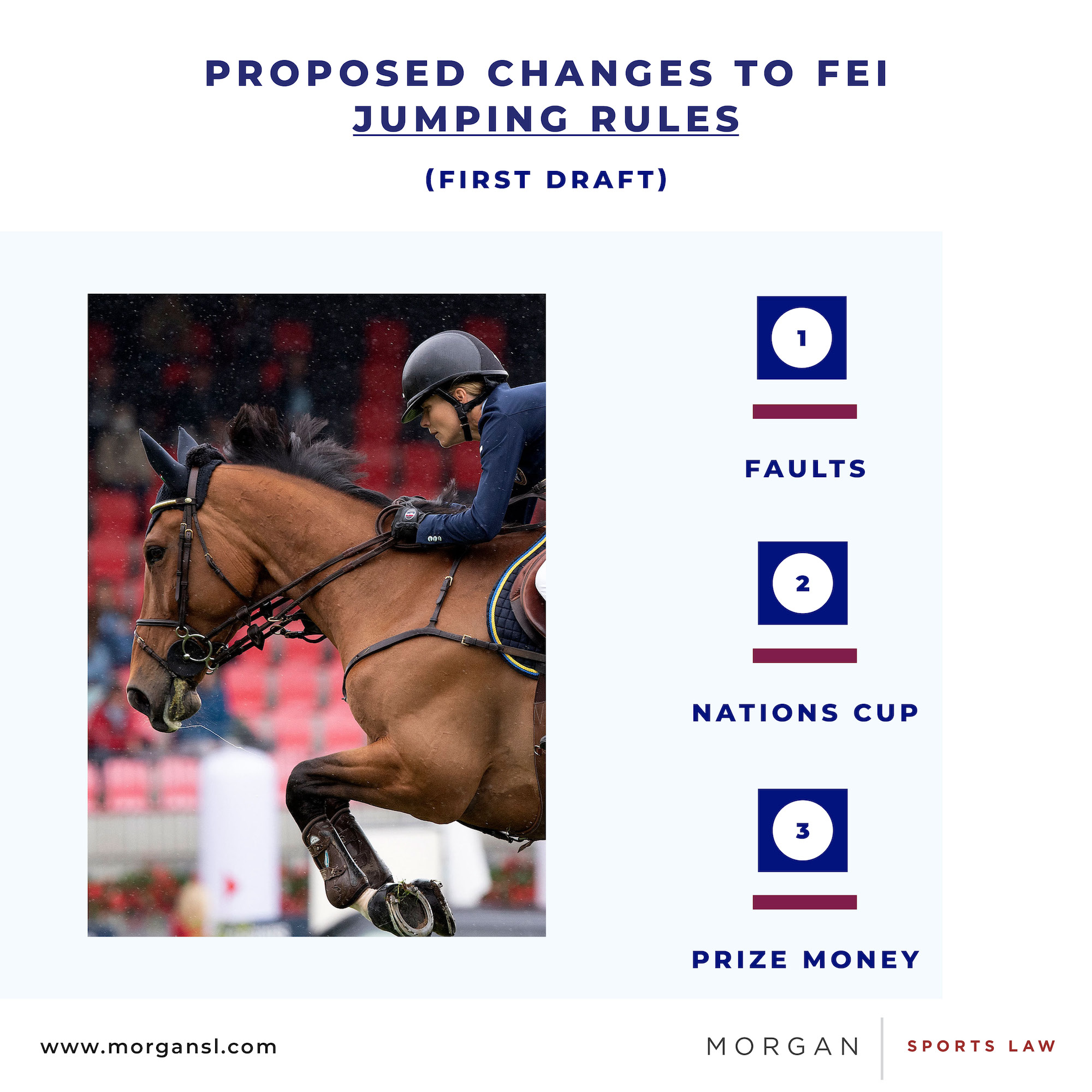
Para Dressage
Judges Supervisory Panel: The FEI is proposing to have a Judges Supervisory Panel (“JSP”) in para dressage at the Paralympic Games (dressage at the Olympic Games already has a JSP).
The JSP will be made up of two judges appointed by the FEI, and its purpose is to ensure that judging is fair. If a judge’s final score for a combination varies by 6% or more to the average score from the other judges, the JSP may, if both members agree, change that score to the next closest score. This system will be tested at European Championships Para Dressage Riesenbeck, in September 2023.
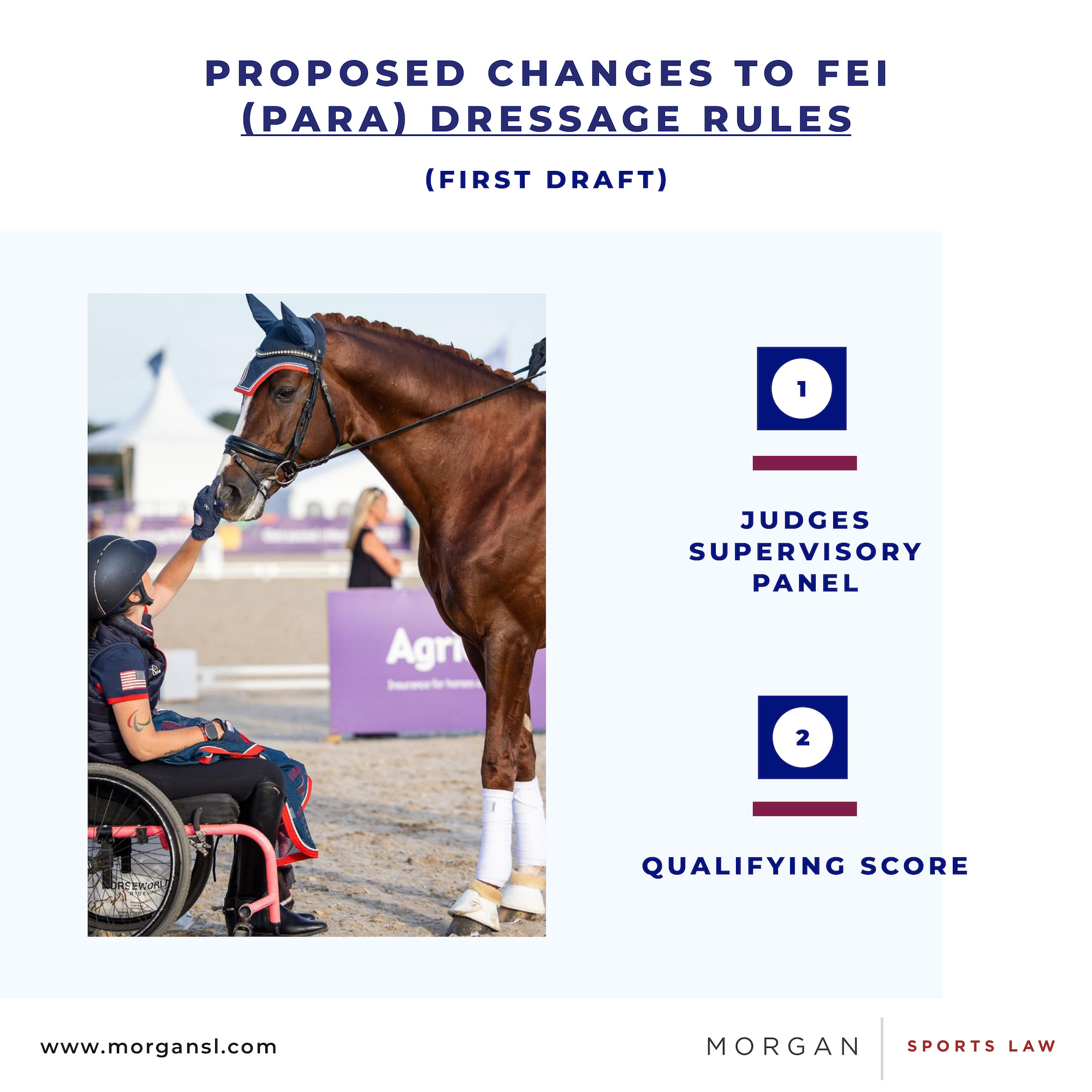
Dressage
Qualifying score: This year the FEI introduced a rule requiring a rider to score at least 65% in the grand prix of CDI4* and CDI5* to participate in the grand prix special or grand prix freestyle at the same show. The qualifying score remained 60% for CDI3*. This caused major issues at several shows, whereby top riders were not progressing to the grand prix special or grand prix freestyle.
Following requests from several NFs, the FEI is proposing to reverse this change – so that the minimum score in CDI4* and CDI5* will revert to 60%.
Eventing
Course Designers: The FEI recently introduced a rule preventing Course Designers from officiating at the same venue for more than 6-8 consecutive years (depending on the level of competition). This was designed to bring fresh faces into the sport. However, concerns have been raised that new Course Designers may not be experienced enough with a particular venue to take over the course design.
NFs have made various suggestions in this regard and the FEI has proposed a new requirement of an assistant Course Designer at all CCI4*-L and CCI5*-L (the idea being that the assistant will shadow the Course Designer and learn the trade).
Conflict of Interest: As is standard across all disciplines, Eventing Officials must avoid conflicts of interest. However, there have been some issues where Course Designers have had a conflict of interest, but no other Course Designer is available to officiate. The FEI is therefore proposing to allow Course Designers with conflicts of interest to work at lower level events, provided they declare and have this approved in advance.
Officials: The rules on the appointment of Officials have been updated to reflect the changes to the Eventing Officials’ Education System which took effect this year. More information can be found here.
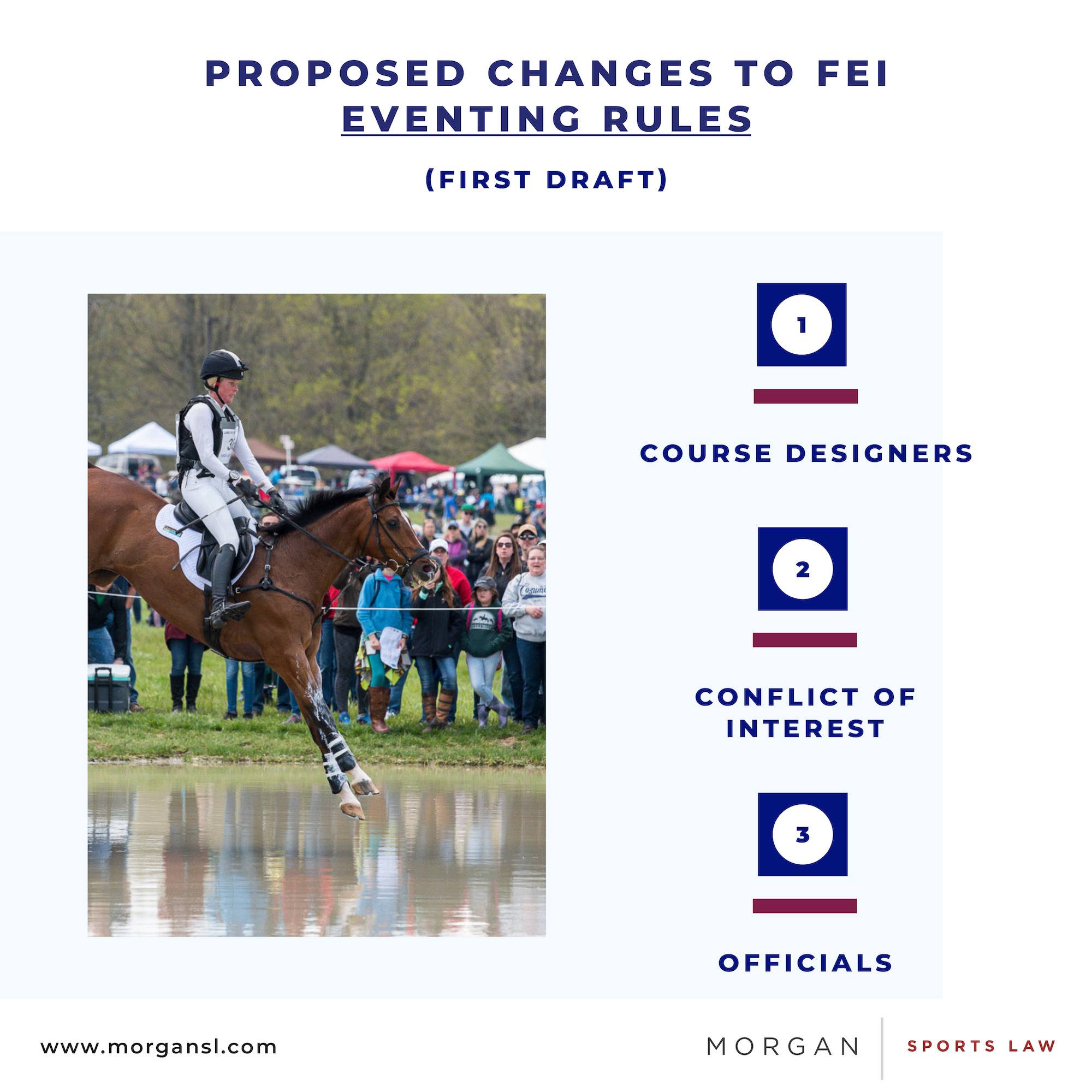
Driving
Driving Recorded Warning: The FEI is proposing to introduce a Driving Recorded Warning, similar to the system which already exists in Eventing. The warning may be given by certain senior Officials for offences related to horse welfare, including dangerous driving (which will be defined in a new annex to the Driving Rules), blood on the horse, whip marks and excessive whipping. The athlete will have the right to explain themselves before the warning is given. An athlete who receives three or more Driving Recorded Warnings in a 24-month period will automatically be suspended for two months.
Relatedly, under the proposals, senior officials may immediately eliminate a combination for dangerous driving or if it is in the best interests of the wellbeing / safety of the horse or athlete.
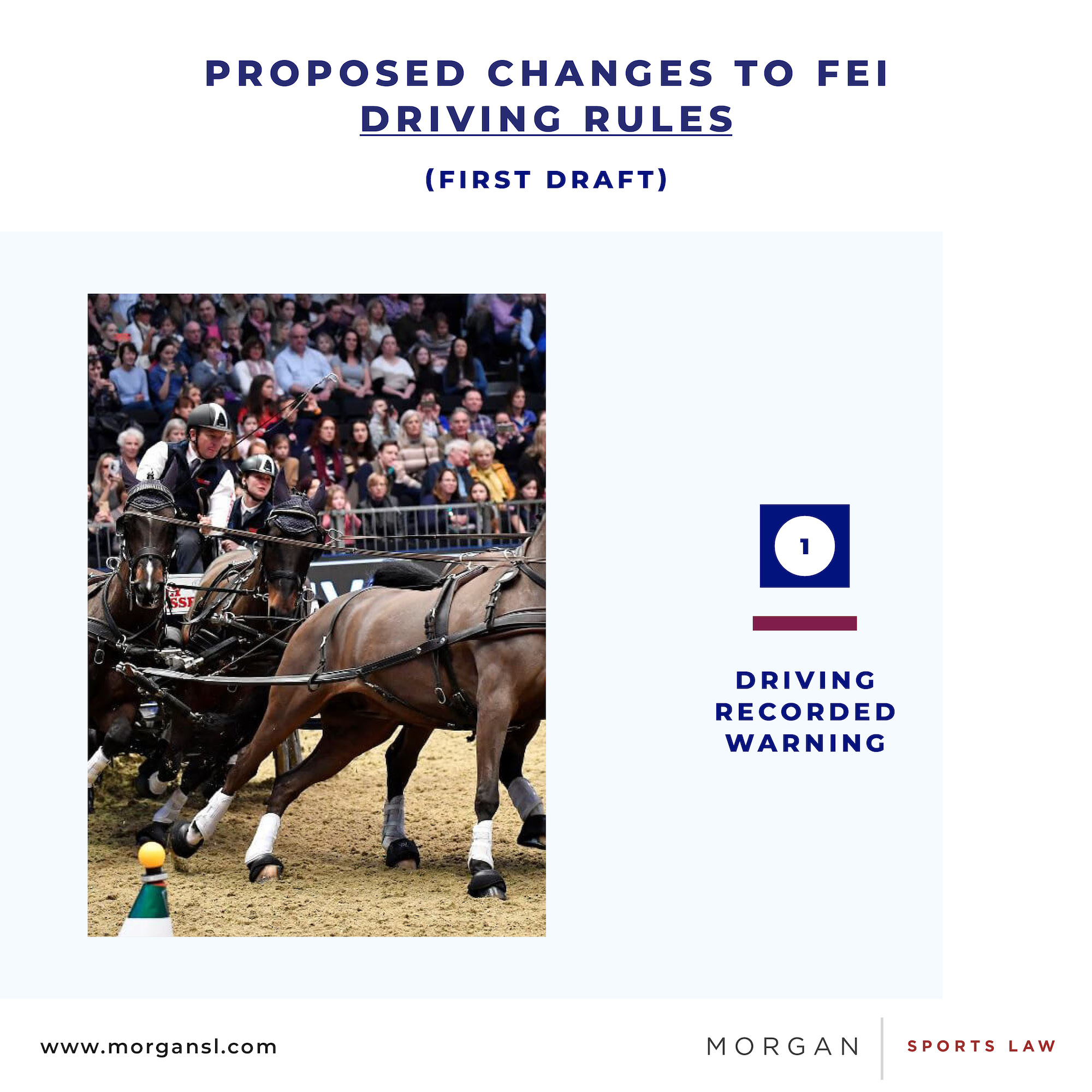
Vaulting
Two starts: The FEI is proposing to allow vaulting athletes to start twice in a competition at an event but has rejected requests from stakeholders / NFs to allow the same horse to start twice – a different horse must be used each time.
Countdown: Several NFs have asked the FEI to consider introducing a 90 second countdown before the test starts, to ensure the horse and athlete are ready. The German NF is apparently testing this system in national events and the FEI has said it will review the feedback before considering introducing it for FEI events.
Squad Free Tests: The FEI is proposing to reduce the time limit for Squad Free Tests of each level and to remove triple exercises from 1* tests.
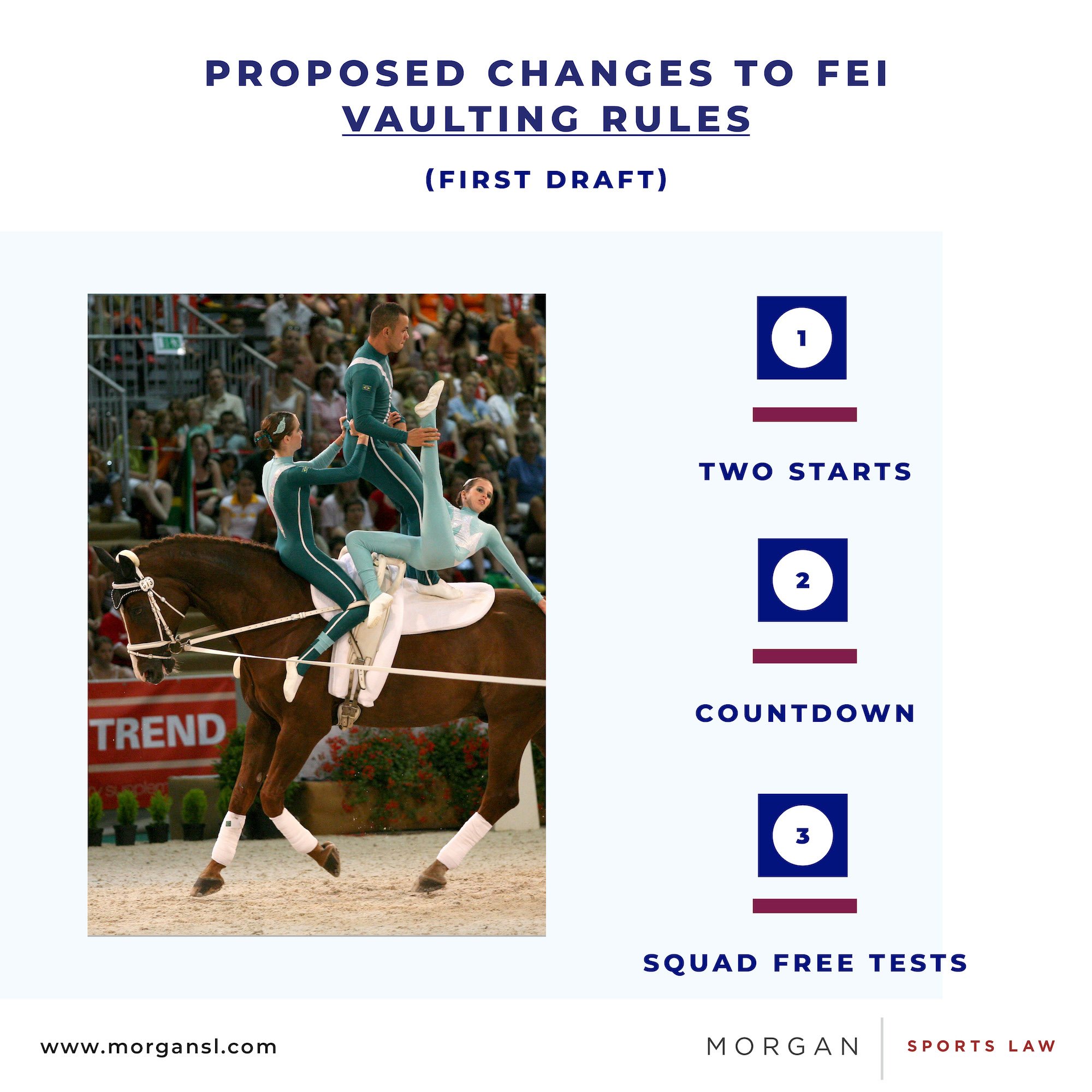
What now?
You have until 16 August 2023 to provide feedback to the FEI, via your NF or stakeholder organisation. Your voice can count, but only if you make it heard.
Authored by
Emma Waters
Senior Associate
Equestrian Services Team
Ellen Kerr
Trainee Solicitor
Equestrian Services Team


